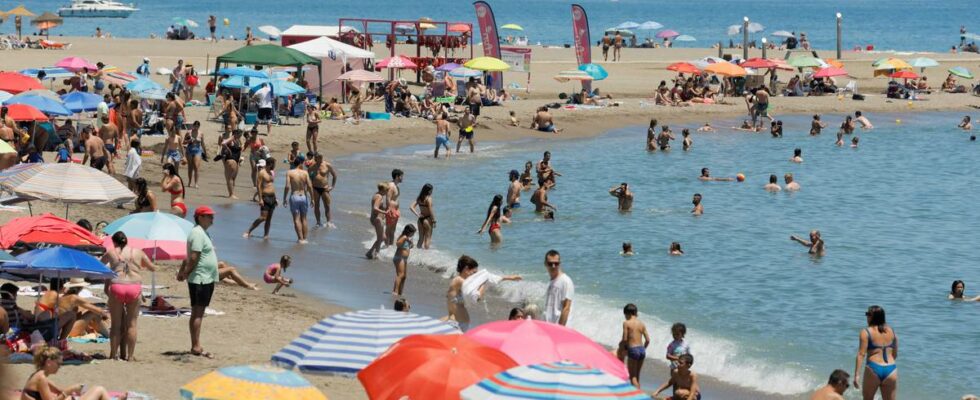Most of us feel that our private finances have come under increasing pressure in recent years. The key interest rate is a staggering 4.5 per cent. The prices of groceries and other necessities have risen sharply. The Norwegian krone has also weakened. This has made it more expensive to go on holiday abroad. Many therefore chose to take their holidays at home in Norway. But even though the wallets have become tighter, many still holiday abroad. Norwegian informs news that they had over 330,000 travelers out of the country in July. That is 6 percent more than the same month last year. Debt increased sharply Many people use credit cards both to book trips and to pay for goods and services during the holiday. It can turn out bad if you draw the card more than you can afford. Many have flown abroad on holiday this summer. Here, a Norwegian flight takes off from Stavanger Airport. Photo: Paul Kleiven / NTB Figures from the Debt Register show that consumer debt increased sharply in July, after a decrease in June. In total, Norwegian consumers owe NOK 165.7 billion. This is an increase of 3.5 billion from June and 11.1 billion from July last year. It is the use of credit cards that contributes the most to the increase. – When the credit card invoices are to be paid in August, we will get the answer to how many people could afford this. If the invoices are not paid, the credit card debt becomes interest-bearing with high interest, says general manager Egil Årrestad at the Debt Register. Do you have consumer debt after the holiday? Yes, but I manage to pay what I owe. Yes, I will have enough payment problems this autumn. No, I don’t spend money I don’t have. Show result See advice for those who have payment problems further down in the case. More people may have payment problems When consumer debt grows, the risk of more people having payment problems also increases. Managing Director Egil Årrestad in the Debt Register. Photo: Gjeldsregisteret AS – The figures indicate that more people may have payment challenges. The increase in interest-bearing consumer debt shows that few have prioritized paying off the debt in July, says Årrestad. The interest-bearing consumer debt was NOK 132.7 billion in July, up almost NOK 8 billion from the previous year. – Both consumer loans and overdue “credit card debt” are increasing, so the interest burden may become noticeable beyond the autumn, says Årrestad. Debt collection claims have become more and more numerous. Christoffer Steen-Hansen is head of analysis at Kredinor, which is Norway’s largest debt collection agency. They have also noticed that consumer debt increased sharply in July. – It will be exciting to see how this develops in the autumn, when the bills fall due after the summer holidays and actually have to be paid, he says. According to Steen-Hansen, Kredinor has received more collection cases this year than last year. Head of analysis Christoffer Steen-Hansen in Kredinor. Photo: Kredinor – So far this year, we have seen an increase in the number of new debt collection claims of 9 per cent, he says. The size of debt collection claims is also increasing. – The increase there is 20 per cent. This means that the requirements are on average greater this year than last year, says Steen-Hansen. Certain groups are struggling more Kredinor does not feel that the situation is dramatic. – The figures so far this year are still somewhat lower than we saw before the pandemic. 2019 was a year with relatively many collection cases compared to the years we get, but we are still slightly below that level, says Steen-Hansen. It can become an expensive affair if you use the credit card more than you can afford. Photo: Gorm Kallestad / NTB/news He points out that the Norwegian economy has generally proven to be quite strong since the inflation and interest rate shock in the wake of the pandemic. – Although we see this increase in debt collection cases, it seems that things are going quite well for most of us, says Steen-Hansen. There are still some groups that struggle more. – For example, the unemployed, people with very large loans in relation to their income and those who do not own their own home. And many in these groups are young, says Steen-Hansen. Take action early If you are faced with challenges after the holiday, you should tackle the problems early. – Stay ahead of possible payment problems and contact the bank as soon as possible. Together you can find solutions so that you avoid debt collection claims, says Årrestad. He also suggests contacting debt advisers in Nav if the problems become too great. If you are unlucky enough that overdue bills end up with debt collection claims, Kredinor is clear that it pays to contact them early. – Our advisers help to find solutions. Unfortunately, it is expensive to wait to deal with the situation. Closing the eyes or pushing the problems under the rug is not a good strategy, says Steen-Hansen. Published 26/08/2024, at 20.21
ttn-69
Holiday debt increased sharply – more people may have payment problems – news Norway – Overview of news from various parts of the country

